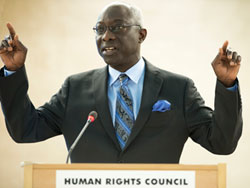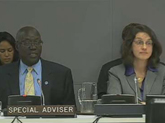Work of the Office
Projects
The Responsibility to Protect and Non-state armed groups
Where non-state armed groups (NSAG) exert control over territories and populations, governments may be unable or unwilling to fulfill their responsibilities to protect populations from genocide, war crimes, ethnic cleansing and crimes against humanity in those areas. There may be cases, as well, where officials or political figures have encouraged NSAGs to threaten or commit such crimes. Some NSAGs appear to have a specific policy of targeting and intimidating civilian populations as a way of advancing particular political agendas.
At the 2005 World Summit, Member States did not address the responsibilities of non-state actors or armed groups. In his 2009 report on “Implementing the Responsibility to Protect”, the Secretary-General suggested that such groups should be expected to observe international standards and to refrain from inciting or committing the four specified crimes. They, too, should be held accountable for their actions in this regard. However, a strategy for implementing the Responsibility to Protect in the case of NSAGs has not yet been elaborated.
In September 2011, the Office initiated a project with Dr. William Reno, Associate Professor and Director of Graduate Studies at the University of Wisconsin, Madison to respond to the need for specific policy guidelines and operational methodologies for identifying, assessing, and responding to situations involving non-state armed groups that control or target civilian populations and put them at risk of genocide, war crimes, ethnic cleansing, and/or crimes against humanity.
For more information about this project, please contact osapg@un.org.
Dangerous speech on the road to genocide
Inflammatory speech often precedes mass atrocities, especially genocide. As such, it is part of the social process that makes genocide possible, as demonstrated by Radio RTLM in the Rwanda genocide. Since then, courts have acknowledged the link between speech and genocide by trying the world’s first incitement to genocide cases. However, the new jurisprudence has not described the crime fully enough to allow consistent identification of new examples of incitement to genocide.
In February 2010, Dr. Susan Benesch and the Office initiated a project to address this gap. The project will result in (1) a blueprint for monitoring dangerous speech in situations at risk of genocide and mass atrocities, (2) a methodology for gauging the dangerousness of specific speech acts, and (3) policy response options to limit the effects of dangerous speech. The research is based on a case study (Kenya ) and builds on Dr. Benesch’s knowledge and expertise on the subject matter.
The Special Adviser on the Prevention of Genocide hosted a well attended event on “Dangerous speech on the road to genocide” on 28 October 2010 at United Nations Headquarters in New York. Over 100 representatives from Member States, the United Nations, civil society and academia attended Professor Susan Benesch’s presentation on the project she and the Office of the Special Advisers have initiated to establish a methodology to identify, monitor and limit the catastrophic effects of dangerous speech. For more information on the project, watch the webcast.
On 1 and 5 February 2013, the Office partnered with the United States Holocaust Memorial Museum, the United Nations Special Rapporteur on the Promotion and Protection of the Right to Freedom of Opinion and Expression and the Permanent Mission of Norway to the United Nations to organise two high-level events on hate speech and incitement to genocide at the United Nations Headquarters in New York and at the United States Holocaust Memorial Museum in Washington DC. At both events, expert panelists explored the distinction between hate speech and incitement to violence, challenges related to monitoring incitement to genocide and policy approaches, and tools to address offensive speech that do not infringe on freedom of expression. They discussed the ongoing challenge of reconciling protection of the right to freedom of opinion and expression while combating incitement that could lead to genocide and other violence based on hatred.
On 22 February 2013, the Special Adviser on the Prevention of Genocide chaired an expert seminar in Geneva, Switzerland, on ways to curb incitement to violence on ethnic, religious, or racial grounds in situations with imminent risk of atrocity crimes. The seminar was organised by the Office in collaboration with the Special Rapporteurs on freedom of opinion and expression, racism and freedom of religion. Other participants included experts from OHCHR, UNESCO, academia, the media and think tanks. The outcome of the workshop was a set of draft policy recommendations for State and non-State actors on ways to curb incitement to violence on ethnic, religious or racial grounds in situations where there is an imminent risk of atrocity crimes.

On 21 February 2013, the Special Adviser on the Prevention of Genocide participated in an event in Geneva, Switzerland, to launch the “Rabat Plan of Action on the prohibition of incitement to national, racial or religious hatred that constitutes incitement to discrimination, hostility or violence”. This Plan of Action, developed following a series of regional consultations, provides a range of tools to guide policymakers, including national legislators and judicial authorities, towards more effective implementation of the international standards regarding hate speech and incitement. The Rabat process, which has engaged experts from across all regions, focused on the two great pillars of international law on this topic: the International Covenant on Civil and Political Rights and the International Convention on the Elimination of All Forms of Racial Discrimination.
Case studies on constructive management of diversity
If genocide is an extreme form of identity-related conflict, genocide prevention revolves around the constructive management of diversity. A critical step is therefore to identify the factors (discriminatory practices) in a given situation that lead to/account for acute disparities in the administration of a diverse population, and to seek ways to diminish and eventually eradicate these possible causes of genocidal violence. On behalf of the Office, in 2010 the NGO Fund for Peace prepared the first of several country case studies based on the Office’s Analysis Framework , looking at lessons learned in states’ management of diverse populations. The case studies completed have focused on Nigeria and South Africa.
